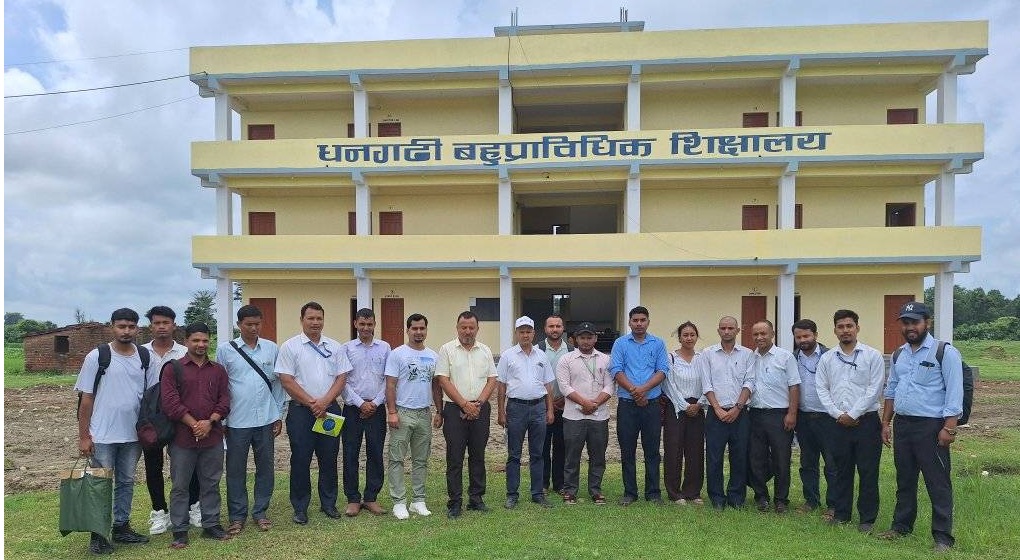Overview
Dhangadhi Polytechnic Institute (DPI), located in Dhangadhi Sub-Metropolitan City, Kailali, is a growing center for technical education in Nepal’s Far-Western region. Established in 2076 BS (2020 AD), DPI is Nepal’s second community-initiated polytechnic institute. It focuses on expanding students' access to practical and employment-based learning across Sudurpaschim Province.
DPI operates under the affiliation of the Council for Technical Education and Vocational Training (CTEVT). It offers diploma-level programs to empower youth by teaching them relevant skills that align with local and global employment demands.
Institutional Background
Founded with a strong social purpose, DPI was envisioned by the Dhangadhi Sub-Metropolitan City to bridge the educational gap in technical and vocational fields. It responds to the increasing demand for skilled professionals in Nepal's far-western belt, which often lacks institutional infrastructure compared to urban centers.
The institute is committed to producing a competent middle-level workforce through affordable, practice-oriented education, especially targeting marginalized and underserved communities.

Location and Infrastructure
Dhangadhi Polytechnic Institute is in the heart of Dhangadhi, a strategic urban center in Kailali District. The campus includes essential facilities for technical learning, including practical training areas, hospitality demonstration rooms, classrooms, administrative blocks, and student support services. Though still developing, the institute steadily expands its resources to accommodate future programs and growing student interest.
Vision and Mission
Vision Statement
DPI aims to become a self-reliant and prominent polytechnic institution in Far-Western Nepal. The long-term vision is to enhance employability through high-impact vocational training that benefits individuals, families, and the broader community.
Mission Objectives
The institute aims to support school-leaving and SEE/+2 graduates by equipping them with employable skills. Through industry-relevant training models, DPI focuses on practical learning, technical proficiency, and career readiness.
Core Goals and Objectives
-
Accessible and Affordable Education: Deliver technical courses at diploma and TSLC levels, making them accessible to students from all social backgrounds, especially disadvantaged and rural populations.
-
Employment-Oriented Training: Offer job-focused programs that align with labor market needs. Emphasis is placed on hospitality, construction, and surveying trades with strong domestic and international employment potential.
-
Skill Development for Self-Employment: Deliver short-term vocational courses that help unemployed youth generate income opportunities within their communities.
-
Scholarship Access and Equity: Provide scholarship opportunities through the CTEVT entrance mechanism to ensure inclusive education for academically deserving and economically challenged candidates.
Academic Program
Diploma in Hotel Management (DHM)
-
Affiliation: CTEVT (Council for Technical Education and Vocational Training)
-
Total Seats: 40
-
Duration: 3 years
-
Scholarship Quota: 4 seats (Based on performance in CTEVT scholarship entrance exam)
-
Minimum Requirement: SEE (Class 10) pass or equivalent
The DHM program prepares students for technical and supervisory roles in the hospitality sector. Through theoretical learning and hands-on experience, students gain skills in hotel operations, food and beverage management, front office services, and housekeeping. The curriculum reflects national competency standards, making graduates job-ready for national and international markets.
Students in this program participate in industrial training and practical modules that simulate real-world hospitality settings. The program also supports personality development and workplace communication, crucial skills in the hospitality industry.
Admission Process
Admission to the Diploma in Hotel Management program is based on passing the CTEVT entrance examination. The selection process ensures transparency and merit-based enrollment. Students applying under the scholarship scheme must meet the eligibility and ranking criteria set by CTEVT.
Student Support and Opportunities
DPI offers student-focused support services to help learners succeed academically and in their careers. These include:
-
Career Counseling: Guidance on employment pathways and self-employment planning.
-
Field Exposure: Opportunities to engage in practical experiences through internships, hotel visits, and project-based learning.
-
Skill Certification: Graduates receive nationally recognized diplomas, increasing their employability in Nepal and abroad.
The institute works closely with industry professionals and stakeholders to update training modules regularly, ensuring that students receive relevant knowledge and up-to-date practices.
Social Inclusion and Community Impact
One of DPI's distinguishing features is its inclusive approach to education. The institute welcomes students from marginalized backgrounds, including women, ethnic minorities, and economically disadvantaged groups. By making technical education locally available, DPI helps reduce outmigration for education and employment and promotes skill development within the community.
The vocational approach also supports national goals related to poverty reduction, rural upliftment, and workforce development.
Institutional Strengths
-
Community Ownership: DPI is a community-driven initiative that reflects strong local ownership and governance. This contributes to accountability and responsiveness in program delivery.
-
Practical Learning Model: Emphasis on industry-aligned skills ensures students graduate with hands-on competencies.
-
Affordable Education: DPI remains committed to making education affordable without compromising quality, creating opportunities for underprivileged youth.
-
Strategic Location: As a polytechnic in a growing urban hub, DPI is an important access point for technical education in Far-Western Nepal.
Future Plans
The institute plans to introduce more diploma-level programs and short-term training based on market needs. Upcoming courses may include construction technology, civil engineering, and information technology—fields with high growth potential in Nepal and abroad.
DPI also aims to collaborate with employers, training providers, and local governments to create a pipeline for employment and entrepreneurship support.
Conclusion
Dhangadhi Polytechnic Institute plays a vital role in extending technical education to the underserved population of Sudurpaschim Province. With its commitment to practical learning, affordable access, and employment readiness, the institute continues to shape the future of young learners in Nepal’s Far-West.
Whether students aim for a professional career in hospitality or want to create self-employment avenues in their communities, DPI provides a strong foundation for skill-based success.












